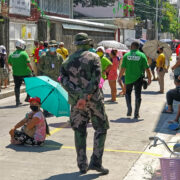PH labor market rebounding but not recovering – IBON
In reaction to the statement of the National Economic and Development Authority (NEDA) upon the release of the recent labor force survey, research group IBON said that the labor market rebounding as lockdown restrictions are eased should not be mistaken as ‘recovery’. More than people returning to work, the term should mean returning to the same levels of employment as before. Recovery can only happen with substantial economic stimulus including sufficient government financial assistance or emergency subsidies to workers affected by the pandemic, IBON said.
The official unemployment rate according to the Philippine Statistics Authority (PSA) is 8.7% or about 3.8 million unemployed in October 2020. NEDA compares the October unemployment figure with those of previous quarters (10% in July and 17.6% in April) to show as a sign of recovery.
But IBON noted that the number of employed fell by 2.7 million to 39.8 million in October 2020 from 42.6 million in October last year. The group also noted that labor force participation rate (LFPR) has fallen to a remarkably small 58.7% in October 2020, causing the labor force to shrink by 933,000.
IBON estimated a different unemployment figure.According to the group, if LFPR in October 2020 stayed at its 61.4% level in October 2019, the labor force would be around 45.6 million, which is 1.98 million more than officially reported.
IBON added this 1.98 million, which it referred to as invisibly unemployed, to the officially reported 3.81 million, bringing the real number of unemployed to 5.79 million and the real unemployment rate at 12.7 percent.
The group also said that though underemployment rate fell to 14.4%, this does not indicate that the quality of work has improved. This is most likely, IBON said, because many of the employed have stopped searching for work due to pandemic conditions and lack of job prospects with many small businesses closing down.
The group pointed out that the inability of the economy to recover thus affecting job creation is hugely due to the lack of a substantial economic stimulus. This pertains to government spending that can arrest economic decline through increased or revitalized economic production and strengthened consumers’ purchasing power.
But government’s response is too little for such a huge economic decline, IBON said. The Php165.5-billion Bayanihan 2 is niggardly for urgent attention areas such as health system recovery, financial aid to vulnerable sectors and support for agriculture and small businesses. IBON also hit the 2021 proposed national budget, that except for tokenistic allocations, is no longer providing socioeconomic relief to workers and financial assistance to agriculture and MSMEs.
Meanwhile, government’s economic managers are determined to retain the huge Php1.1 trillion budget allocation for infrastructure development as their main stimulus program and to propose corporate income tax cuts through the passage of the Corporate Recovery and Tax Incentives for Enterprises (CREATE) bill.
Recovery cannot happen with such government neglect of labor and the economy, IBON said. Scrimping on meaningful economic stimulus prevents the health system to cope with the pandemic and the workers to return to work. It also leaves behind the more basic economic sectors of agriculture and domestic manufacturing in creating more meaningful jobs, IBON added.
The economy may indeed recover from its collapse. But like such ‘recoveries’ of the past when no meaningful government intervention took place, it would take a while, if at all, for jobs and incomes to be fully recovered and improved, said the group. #
= = = = = =
Kodao publishes IBON articles as part of a content-sharing agreement.







